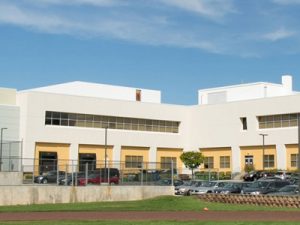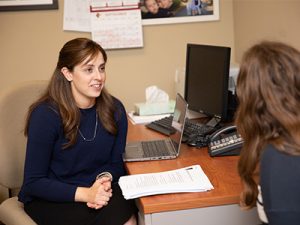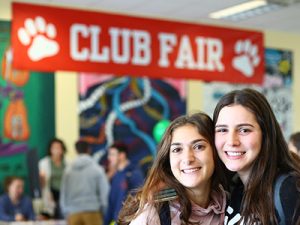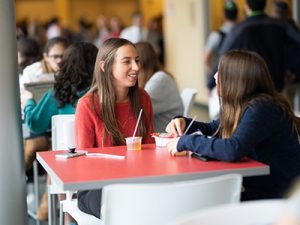Frisch Showcases ‘Names, Not Numbers©’ Documentary
May 18, 2018
 On May 14, 20 Yeshivat Frisch students who participated in “Names, Not Numbers©” had the opportunity to showcase their work from the past year, with the screening of a documentary about their collection of four powerful Holocaust testimonies. Parents, friends, teachers, students and the survivors themselves gathered in Frisch’s auditorium for dinner, followed by the screening of the documentary, by Justin Seibel.
On May 14, 20 Yeshivat Frisch students who participated in “Names, Not Numbers©” had the opportunity to showcase their work from the past year, with the screening of a documentary about their collection of four powerful Holocaust testimonies. Parents, friends, teachers, students and the survivors themselves gathered in Frisch’s auditorium for dinner, followed by the screening of the documentary, by Justin Seibel.
 The goal of “Names, Not Numbers©,” created by educator Tova Fish-Rosenberg, is to teach students about the Holocaust through making their own documentaries. Student participants researched the history of the Holocaust, learned interviewing techniques from a journalist and filming techniques from videographers.
The goal of “Names, Not Numbers©,” created by educator Tova Fish-Rosenberg, is to teach students about the Holocaust through making their own documentaries. Student participants researched the history of the Holocaust, learned interviewing techniques from a journalist and filming techniques from videographers.
Then, in groups of four, the students interviewed the survivors directly: Dr. Alex Levy, whose mother miraculously managed to smuggle him across the German-Belgian border and who survived hidden in a Belgian orphanage; Trudy Album, a Czech Jew who survived the Auschwitz and Plaszow concentration camps; and Walter Spier, an Auschwitz and death march survivor who is the grandfather of Frisch Director of Informal Education Rabbi Jonathan Spier. In addition, Dean of Student Life and Welfare Rabbi Dr. John Krug was interviewed about his late father’s, Walter Krug, survival story, which involved escape to the eastern edges of Russia and China, service as a pilot for the United States and a harrowing two-year imprisonment in a Japanese prisoner-of-war camp.
 Junior Michal Katz described the emotional intensity of listening to Mr. Spier’s experiences, ”You’re sitting in front of such an amazing person who went through [these terrible experiences] and remained just as Jewish,” said Katz. “It’s humbling and also really difficult…All these experiences were difficult and set him back and were hardships, yet he was able to move forward.”
Junior Michal Katz described the emotional intensity of listening to Mr. Spier’s experiences, ”You’re sitting in front of such an amazing person who went through [these terrible experiences] and remained just as Jewish,” said Katz. “It’s humbling and also really difficult…All these experiences were difficult and set him back and were hardships, yet he was able to move forward.”
Junior Serena Bane, part of the group who interviewed Album, also participated in “Names, Not Numbers©” in eighth grade. “No matter how many stories you hear, no matter how many people you interview, you will never hear the same story twice,” she said. “There are no words to describe the tragedy that our ancestors suffered but we owe it to them, we owe it to ourselves and we owe it to our future descendants to never, ever forget.”
Students edited the interview footage into oral testimonies of 20 minutes each. The entirety of the footage is preserved at Yad Vashem, the Hebrew University of Jerusalem and Yeshiva University’s Mendel Gottesman Library.
 Rabbi Shalom Richter mentored the students over the course of the project. “The students were engaged throughout the whole process and really learned a lot about history, but even more so about themselves,” said Richter. “The fact that they actually had the opportunity to interview a survivor gave them a sense of their own place within the context of Jewish history and the ability to find their own unique place in the context of Jewishness.”
Rabbi Shalom Richter mentored the students over the course of the project. “The students were engaged throughout the whole process and really learned a lot about history, but even more so about themselves,” said Richter. “The fact that they actually had the opportunity to interview a survivor gave them a sense of their own place within the context of Jewish history and the ability to find their own unique place in the context of Jewishness.”
Assistant Principal Rabbi David Goldfischer addressed the audience prior to the documentary screening. “You have learned the survivors’ stories, you have been able to make them your own and you will be able to pass them on to your children and their children in an everlasting chain,” he said. “That is a tremendous zchut.”






 On May 14, 20 Yeshivat Frisch students who participated in “Names, Not Numbers©” had the opportunity to showcase their work from the past year, with the screening of a documentary about their collection of four powerful Holocaust testimonies. Parents, friends, teachers, students and the survivors themselves gathered in Frisch’s auditorium for dinner, followed by the screening of the documentary, by Justin Seibel.
On May 14, 20 Yeshivat Frisch students who participated in “Names, Not Numbers©” had the opportunity to showcase their work from the past year, with the screening of a documentary about their collection of four powerful Holocaust testimonies. Parents, friends, teachers, students and the survivors themselves gathered in Frisch’s auditorium for dinner, followed by the screening of the documentary, by Justin Seibel. The goal of “Names, Not Numbers©,” created by educator Tova Fish-Rosenberg, is to teach students about the Holocaust through making their own documentaries. Student participants researched the history of the Holocaust, learned interviewing techniques from a journalist and filming techniques from videographers.
The goal of “Names, Not Numbers©,” created by educator Tova Fish-Rosenberg, is to teach students about the Holocaust through making their own documentaries. Student participants researched the history of the Holocaust, learned interviewing techniques from a journalist and filming techniques from videographers. Junior Michal Katz described the emotional intensity of listening to Mr. Spier’s experiences, ”You’re sitting in front of such an amazing person who went through [these terrible experiences] and remained just as Jewish,” said Katz. “It’s humbling and also really difficult…All these experiences were difficult and set him back and were hardships, yet he was able to move forward.”
Junior Michal Katz described the emotional intensity of listening to Mr. Spier’s experiences, ”You’re sitting in front of such an amazing person who went through [these terrible experiences] and remained just as Jewish,” said Katz. “It’s humbling and also really difficult…All these experiences were difficult and set him back and were hardships, yet he was able to move forward.” Rabbi Shalom Richter mentored the students over the course of the project. “The students were engaged throughout the whole process and really learned a lot about history, but even more so about themselves,” said Richter. “The fact that they actually had the opportunity to interview a survivor gave them a sense of their own place within the context of Jewish history and the ability to find their own unique place in the context of Jewishness.”
Rabbi Shalom Richter mentored the students over the course of the project. “The students were engaged throughout the whole process and really learned a lot about history, but even more so about themselves,” said Richter. “The fact that they actually had the opportunity to interview a survivor gave them a sense of their own place within the context of Jewish history and the ability to find their own unique place in the context of Jewishness.”